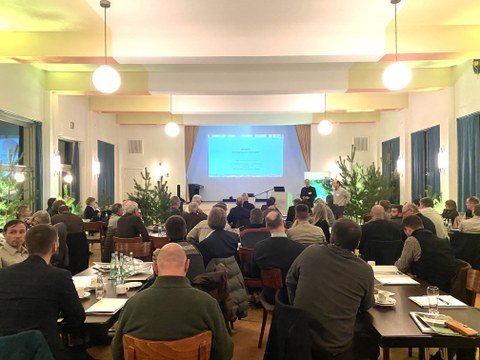Feb 21, 2023
WiWaldI project kick-off in Dessau

WiWaldI kick-off meeting
On February 1, 2023 the official kick-off meeting of the "Wild-Wald-Innovation" project (WiWaldI: Effects of deer and hunting on the development, climate resilience and ecosystem services of our forests ) took place in Dessau. The project started on Juli 1, 2022 and studies the impact of hoofed game on the functional capability of forest ecosystems in Germany and their adaptibility to climate change on sites in the federal states of Baden-Württemberg, Brandenburg, Mecklenburg-Western Pomerania, Lower Saxony, Saxony-Anhalt and Thuringia. The focus is on ecological and economic assessments, game-induced forest development, adapted hunting strategies and the implementation of a future-oriented development of forests.
About 90 participants from science, practice, politics and press took part in the meeting at Kornhaus Dessau. The opening message was given by Hans van der Goltz, project leader and head of Arbeitsgemeinschaft Naturgemäße Waldwirtschaft, followed by welcome speeches of Dr. Eckhard Heuer (Federal Ministry of Food and Agriculture), Bernd Dost (Saxony-Anhalt Supreme Hunting Authority) and Heiko Tschetschorke (Wittenberg district). Afterwards the project coordinator Hanna von Versen introduced the project and its partners as well as its objectives and foci, while Prof. Dr. Christian Ammer and Prof. Dr. Torsten Vor from Georg-August-Universität Göttingen presented their studies on vegetation and regeneration ecology. Dr. Charalambos Neophytou from the Baden-Württemberg Forest Research Institute talked about the genetic diversity assessment of forest regeneration via video call, followed by Claudia Jordan-Fragstein and Prof. Dr. Michael Müller from TU Dresden on the ecosystem reactivity and self-regulation potential with regard to forest health. The economic focus including statistical modelling was presented by Prof. Dr. Thomas Knoke von TU München. Last, Kay Hagemann (Waldkonzepte PartG) and Julia Lidauer talked about knowledge transfer and implementation-oriented communication in the study regions.
During the discussion session Dietrich Mehl, head of the ANW Brandenburg regional group, emphasized again the project's urgency but also stated that there is actually enough knowledge to further advance forest conversion and that it might already be too late. Prof. Dr. Michael Müller appealed to the audience to retain the forest owners' freedom of choice while simultaneously supporting their competences with knowledge and acknowledge and reward those who generate adaptable forests.
The five-year project is funded by the Federal Ministry of Food and Agriculture along with the Federal Ministry for the Environment, Nature Conservation, Nuclear Safety and Consumer Proection via Waldklimafonds (Forest Climate Fund). The project executing organization is the Fachagentur für Nachwachsende Rohstoffe e. V.
